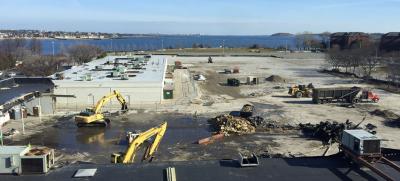May 3, 2017
 The old Bayside Expo site as viewed late last year in the middle of demolition. Bill Forry photo
The old Bayside Expo site as viewed late last year in the middle of demolition. Bill Forry photo
Last Thursday evening, the Dorchester Reporter was the first to report that hush-hush negotiations between UMass and the Kraft family to build a 20,000-seat soccer stadium for the New England Revolution franchise on the old Bayside Expo site were officially over. There would be no deal at this time.
A UMass spokesman later confirmed the report, adding: “We have determined that a potential stadium at the Bayside site does not appear feasible at this point.”
On Friday afternoon, Robert Kraft and his son Jonathan issued a statement giving their take on the matter, noting that they had invested “millions of dollars and thousands of staff hours” working on the plan, which, they said, would have benefited “UMass Boston, the city of Boston and serve as an asset to the surrounding communities, with an operating plan that would benefit all local constituencies.”
They continued: “Unfortunately, and for reasons beyond our control, it has been determined that this project is not feasible to pursue on this site at this time.”
Their statement was accompanied by a set of renderings showing a luminous stadium where the recently demolished, 20-acre Expo Center complex once stood hulkingly along Dorchester Bay.
All of which raises the vexing question: Why, if they were really devoted to getting this sports and entertainment complex built on this site in Dorchester, didn’t the Krafts enlighten us from the beginning about their goals and their level of investment? Why not show us their designs and explain the plan?
Despite numerous media inquiries —including from the Reporter — we were never shown any details about the stadium proposal. Until last Friday. After the deal was declared “dead.” Bizarre.
The first sentence of the Kraft’s statement is perhaps the most intriguing: “In 2015, we were invited to put together a stadium proposal for the former Bayside Exhibition Center site.”
Invited? By whom?
Did the University of Massachusetts and its advisors ask anyone besides Robert Kraft to submit a proposal? No they didn’t, according to our reporting.
The Expo property is now owned by the UMass Building Authority, a quasi-public agency that acts as the real estate agent and developer for the state university system. In December 2015, the Authority initiated a public-private partnership to build the first-ever dormitory on the UMass Boston campus, a development that was envisioned in a Master Plan effort launched under Chancellor Keith Motley nearly a decade ago.
The Authority started the process by issuing a Request for Qualifications (RFQ) — a document that outlined the specifications needed to construct the 1,000-bed tower that is now rising next to the Calf Pasture Pumping Station at the end of Mt. Vernon Street. Eight companies submitted bids, and Capstone Development was chosen as “the best qualified” to build the dorm and dining hall for a reported $120 million. Once finished, a non-profit management entity will own and control the buildings— and UMass will oversee “student life.”
At some point that same year – 2015 – the Krafts were “invited” to “put together a stadium proposal” for Bayside. Apparently, there was no RFQ or RFP.
Keep in mind that that same UMass Boston Master Plan, prepared over several years in consultation with the university’s neighbors in Dorchester, included a detailed outline for the re-use of the Bayside land. There is no mention of a stadium in the document.
So, at some point in 2015, some group or other decided that the state’s public university system could benefit from having a professional sports and entertainment company prepare – without the benefit of competition, neighborhood input, or public scrutiny – a proposal for a sports stadium that no one had to that point envisioned.
Word of the secret talks eventually bubbled out early last summer. But neither the Krafts nor UMass had much to say about the subject. The Building Authority refused a Boston.com request for documents related to their dealings with the Krafts, saying, essentially, that the agency is not subject to the laws that allow the public access to the documents.
Sound shady?
It is. And I say “is” because for all the statements about this deal being “dead,” you’ll notice there’s a common qualifier. Mayor Walsh, who has been generally supportive of the stadium idea, used it when he was asked about the deal’s apparent demise on WGBH radio last week. His response: “I don’t think it’s the right time for that location right now.”
At this point. At this time. Right now. Words to keep in mind.
It’s just a crack, but the door is still ajar. With UMass in crisis mode in a messy “transition” on the Boston campus, and a deep-pocketed sports mogul with powerful allies in the mix, anything is possible.
Whatever happens next, it needs to be part of an open and public process for this site. Between the Boston 2024 debacle (which would have sited the Athletes Olympic Village at Bayside) and the two-year private dance with the Krafts, a prime, 20-acre waterfront site at the edge of a bustling Columbia Point has effectively been held hostage by powerful interests for four years.
It’s time to start anew at Bayside. If that’s going to include a proposal to change agreed-upon use, we hope that UMass officials will make that clear before embarking on a search for developers. Whoever wants to partner with the state — and with existing Columbia Point stakeholders — should do so in the clear light of day.
Villages:
Topics:



